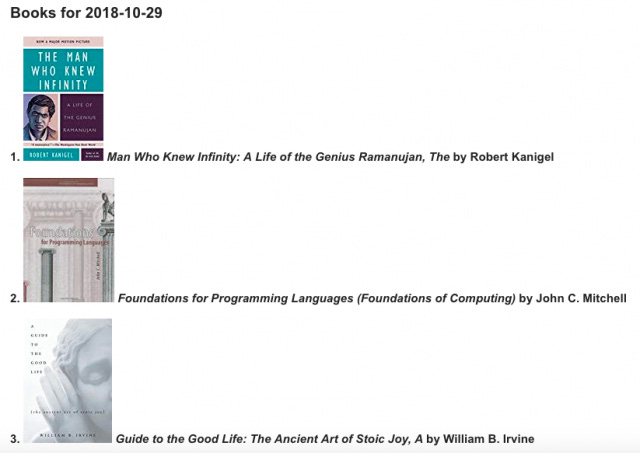Tools for Serendipity + A Short Story
I've recently been exploring the idea of "tools for serendipity": pieces of software that basically super-charge the mind's ability to connect interesting and diverse bits and pieces of information. Happily, there is a whole bunch of work already in this space. For example, there's Readwise, which will email you every few days or so highlighted passages that you have made to your ebooks or articles you've read, helping you to remember them or to spark some sort of idea in your own brain. There's also Robin Sloan's little project that randomly shows him old notes he's written every time he opens a new browser tab.
My own contribution to this space is a jury-rigged attempt to periodically remind myself of old books that I own and should re-examine. I have a text file with a not-quite-complete list of the books that I own (constructed using Libib and its smartphone-based scanner). I pipe this into a small script that runs weekly and emails me a selection of five randomly chosen books that I should revisit, with new eyes. Or, as the subject line of these emails states, these are "Books to Spur Thinking." A sampling of the output from one of these emails from awhile back:

It's not much, but it sure was fun to make (and it was also nice to scan a lot of my books, though Libib does stumble occasionally). This program also makes me recognize that the reasons I initially acquire or read a book can be very different from the state of my mind at a later time; I very often think about these books differently when I revisit them. It's a pleasure to look at these old friends over time. Anyone else you know working on these kinds of projects? I want to know!
In our newest installment of our Systems Thinking Review, here are a few tidbits I've come across that have forced me to think the interconnected complex systems of our world:
So Can We Terraform Mars or Not? Trying to understand some scientific unknowns for an entire planet.
The Bond That’s Still Paying Interest, 280 Years Later: A look at a nearly 300-year-old government bond from France, one that is essentially being handed down from generation to generation (even though its value has dropped precipitously). And it has survived in the face of the massive complexity of societal change over time: "The Linotte rente has endured five French republics, two world wars and persistent, if unsuccessful, attempts by the French government to get rid of it." In other words, thinking long-term involves examining some temporal system thinking.
Software Mutational Robustness: A research paper that studies the idea that software might be more robust than we realize. As per the abstract: "Although software is often viewed as brittle, with small changes leading to catastrophic changes in behavior, our results show surprising robustness in the face of random software mutations."
Did you read something that demonstrates the complex systems around us? Please let me know.
And I recently published online a piece of short fiction: "Constant Decay." It touches on technology, truth, reality, and much more. I hope you enjoy it!
Until next time.


